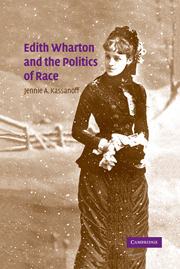Book contents
- Frontmatter
- Contents
- Acknowledgements
- Introduction
- 1 Invaders and Aborigines: playing Indian in the Land of Letters
- 2 “The real Lily Bart”: staging race in The House of Mirth
- 3 “A close corporation”: the body and the machine in The Fruit of the Tree
- 4 The Age of Experience: pragmatism, the Titanic and The Reef
- 5 Charity begins at home: Summer and the erotic tourist
- 6 Coda: The Age of Innocence and the Cesnola controversy
- Notes
- Bibliography
- Index
1 - Invaders and Aborigines: playing Indian in the Land of Letters
Published online by Cambridge University Press: 22 September 2009
- Frontmatter
- Contents
- Acknowledgements
- Introduction
- 1 Invaders and Aborigines: playing Indian in the Land of Letters
- 2 “The real Lily Bart”: staging race in The House of Mirth
- 3 “A close corporation”: the body and the machine in The Fruit of the Tree
- 4 The Age of Experience: pragmatism, the Titanic and The Reef
- 5 Charity begins at home: Summer and the erotic tourist
- 6 Coda: The Age of Innocence and the Cesnola controversy
- Notes
- Bibliography
- Index
Summary
Edith Wharton's 1934 memoir, A Backward Glance, begins on a curious note of historical rupture. Recalling the New York birthplace of her father, George Frederic Jones, Wharton describes a “pretty country house with classic pilasters and balustraded roof” on land that eventually became East Eighty-first Street. Although the original dwelling has long since disappeared, an heirloom print shows a columned residence with “a low-studded log-cabin adjoining it under the elms” (17). According to family legend, the rustic cabin was actually the “aboriginal Jones habitation,” and its colonnaded neighbor a later addition. Wharton, however, doubts the veracity of this account. The log cabin was not, in all likelihood, the family's ancestral seat, she remarks; it was “more probably the slaves' quarters” (18).
The rapidity with which this picture of Yankee self-reliance dissolves into its uncanny double – a repressed portrait of African enslavement – is as breathtaking as it is blunt. For all of its Lincolnian connotations, the Jones log cabin inexorably betrays the system of forced servitude that sustained the Jones family's economic, social and political ascent. Indeed, Wharton's account betrays what Susan Scheckel calls “the fundamental ambivalences of American national identity … the deep ambivalence of a nation founded on the conceptual assertion of natural right and the actual denial of … natural rights” to Indians, African Americans and women (14).
- Type
- Chapter
- Information
- Edith Wharton and the Politics of Race , pp. 8 - 36Publisher: Cambridge University PressPrint publication year: 2004

